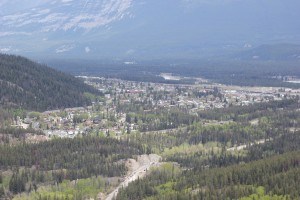 If it feels like you’ve been attending a lot of public consultations lately, you’re not alone.
If it feels like you’ve been attending a lot of public consultations lately, you’re not alone.
Over the past three months Jasper has hosted three different public engagement events for various infrastructure projects in Jasper National Park.
The first event was held by Kinder Morgan on Jan. 26 to discuss the company’s plans to twin its Trans Mountain pipeline from Strathcona County, near Edmonton, to Burnaby B.C.
The second event was held by Parks Canada on March 24 to discuss the proposed Icefields Trail project, which envisions building a 109-kilometre paved bike trail from Jasper to Wilcox Campground.
The third, and most recent event, was held by ATCO Electric about the Jasper Interconnection Project. If approved, it will connect Jasper to the province’s electricity grid.
While each of these events has focused on a different infrastructure project, the message at each event has been the same–don’t worry, trust us.
It would be great if it was really that easy, but experience tells us that we would be wise to be more wary.
For starters, Kinder Morgan got caught with its pants down after claiming there had never been an oil spill in Jasper National Park. Thanks to some vigilant work by environmentalists and academics, the company backtracked; later confirming that there have been six spills recorded in Jasper National Park since 1954, including the second-largest leak in Trans Mountain’s history.
Then there’s Parks Canada.
The agency claims the Icefields Trail project is only at the conceptual phase and no final decisions have been made, yet internal documents obtained under Freedom of Information legislation suggest otherwise.
Not only have dates already been set for when construction should begin the agency has publicly stated the “proposed” project will be completed by March 2019.
As for ATCO Electric, it’s too bad Kinder Morgan and Parks Canada have tainted its public consultations, because by all accounts it appears to be the most transparent.
That being said, the company never asked the public if it wanted to be connected to the provincial power grid. Instead the company made the executive choice that it was too expensive to refurbish the Palisades power plant and opted to build a 45-km power line instead.
If the company was truly interested in the public’s input it would have asked whether the community wanted a power line running through the park in the first place.
Instead the company forged ahead presupposing that this is what the community wanted and leaving it up to its public relations team to downplay concerns.
In each case the public consultation process has so far failed to live up to public expectations, raising serious questions about whether public consultations actually have any meaningful impact or are simply lip service within a predetermine process.
